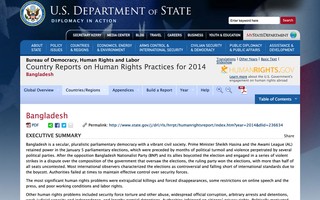
A US State Department report has said Bangladesh is a “secular, pluralistic parliamentary democracy with a vibrant civil society” but is plagued by a plethora of human rights problems. The report has drawn attention to extrajudicial killings, forced disappearances, atrocities on women, infringement on expression and poor working conditions as human rights problems in Bangladesh. The State Department, in its Country Report on Human Rights Practices for 2014, has focussed on these violations in Bangladesh in an overall compilation on the worldwide human rights situation. The department’s Bureau of Democracy, Human Rights and Labor has highlighted “extrajudicial killings and forced disappearances, some restrictions on online speech and the press, and poor working conditions and labor rights” as the country’s “significant human rights problems” last year. Among other transgressions it has included “security force torture and other abuse, widespread official corruption, arbitrary arrests and detentions, weak judicial capacity and independence, and lengthy pretrial detentions”. It has also said the “authorities infringed on citizens’ privacy rights” and added that “politically motivated and intraparty violence remained serious problems”. The report says the Prime Minister Sheikh Hasina and the Awami League retained power in the Jan 5 elections that was “preceded by months of political turmoil and violence perpetrated by several political parties”. It has also said “the opposition Bangladesh Nationalist Party (BNP) and its allies boycotted the election and engaged in a series of violent strikes” over electoral disputes, while the “authorities failed at times to maintain effective control over security forces”. The report says some nongovernmental organisations faced “continued legal and informal restrictions on their activities” and “women suffered unequal treatment”. On several issues of social concern the report has this to say: “Early and forced marriage remained a problem. Many children were compelled to work, primarily in the informal sector, due either to economic necessity or in some instances trafficking. “Discrimination against persons with disabilities was a problem, especially for children seeking admittance to public school. “Instances of societal violence against religious and ethnic minorities persisted, although many government and civil society leaders claimed these acts had political or economic motivations and should not be attributed wholly to religious beliefs or affiliations. “Discrimination against persons based on their sexual orientation continued. “Weak regard for the rule of law not only enabled individuals, including government officials, to commit human rights violations with impunity but also prevented citizens from claiming their rights. “The government took limited measures to investigate and prosecute cases of security force abuse and killing. It says the government has neither released any data on the number of people killed by the security forces nor initiated investigation into such cases. The report quotes NGOs to cite statistics. “The legal aid and human rights NGO Ain o Salish Kendra (ASK) reported that during the first eight months of the year, security forces, including the RAB, committed an estimated total of 113 killings, and the local human rights NGO Odhikar reported security forces killed 136 persons in the first nine months of the year. “There were an estimated 179 extrajudicial killings in all of 2013. The deaths occurred during raids, arrests, and other law enforcement operations. “The government often described these deaths as ‘crossfire killings,’ ‘gunfights,’ or ‘encounter killings,’ terms used to characterize exchanges of gunfire between RAB or police units and criminal gangs, although the media sometimes also used these terms to describe legitimate uses of police force.” It also mentions the gruesome Narayanganj killings in which seven persons were abducted and killed by RAB personnel. The report also refers to forces disappearances, again, based on NGO data. “Disappearances and kidnappings, some committed by security services, continued. According to Odhikar, from January through September, there were 35 disappearances allegedly involving security personnel, compared with 14 in all of 2013. For the same period, ASK estimated there were 80 disappearances, compared with 53 in all of 2013,” says the report. It also touches on press freedom, specially mentioning the ICT contempt charge against British journalist David Bergman, and restriction on internet freedom. The report makes it observations on a host of other issues including the functioning of the judiciary, political procedures and atrocities against women.–bdnews24.com

